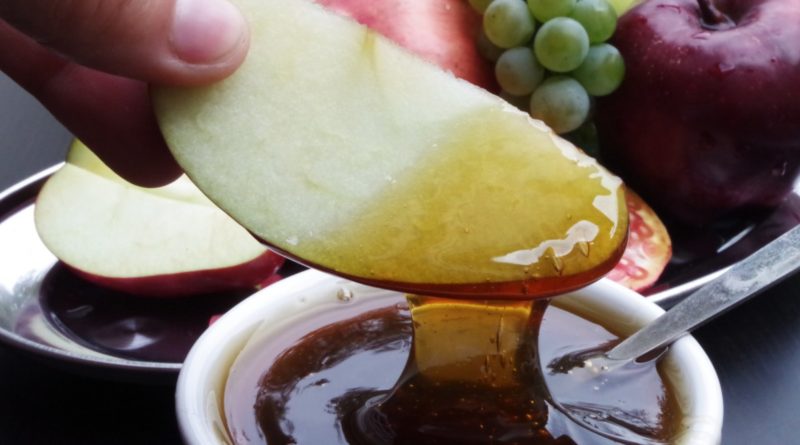Dip the Apples in the…Vegan Honey?
As with any holiday, Jewish or otherwise, Rosh Hashana (the Jewish New Year, which oddly is the first day of the 7th month, not the first month, for reasons I will not go into here) has many symbolic foods that are associated with it. Pomegranates, carrots, leeks, and beets are among the plant foods associated with the holiday meal. Perhaps the custom that is most universal, especially among Jews from eastern Europe descent, is apples, and specifically apples dipped in honey, symbolizing the hope for a sweet new year. Indeed, honey itself takes on a second role, besides being the dip of choice for the apple; it replaces the salt that the challah is dipped in.
Challah, the traditional Sabbath and holiday bread, is formed into a circle rather than the traditional braided loaf and slices are dipped in honey not only for Rosh Hashana, but through the 4 week holiday season ending with Simchat Torah. In my family, it is such a favorite, that salt does not reappear until Hanukah.
But what if you are vegan? Apples are not a problem, and there are plenty of vegan challah recipes out there, but what about the honey?
One solution with biblical origins is silan, a/k/a date syrup or date honey. When the Torah tells us that Israel is a land of milk and honey (חלב ודבש), the “d’vash” is not bee’s honey, it is date honey. There are several brands of silan with kosher certification, including several from Israel. However, dates are expensive, and so many companies mix date syrup with sugar and water, diluting the flavor and possibly compromising its vegan status if the sugar is made with bone-char. Look for silan that is 100% dates with no added ingredients, such as Soom, available in specialty stores, from the company, and on Amazon. Soom is OU certified.


Another option is a product called Just Like Honey. Available from Suzanne’s Specialties of New Jersey, this is an all natural vegan replacement for honey made from rice nectar and natural sweeteners (none refined, no corn syrup, no preservatives, and no-GMO) and is also gluten free. It has the color and texture of real honey, and is delicious. Certified kosher by the Kof-K, the product is available in specialty stores and online from the manufacturer.
Both options are worthy of a place on your Rosh Hashana table, even if you have bee’s honey too. Wishing our readers and partners a shana tova u’mituka – a sweet new year.




